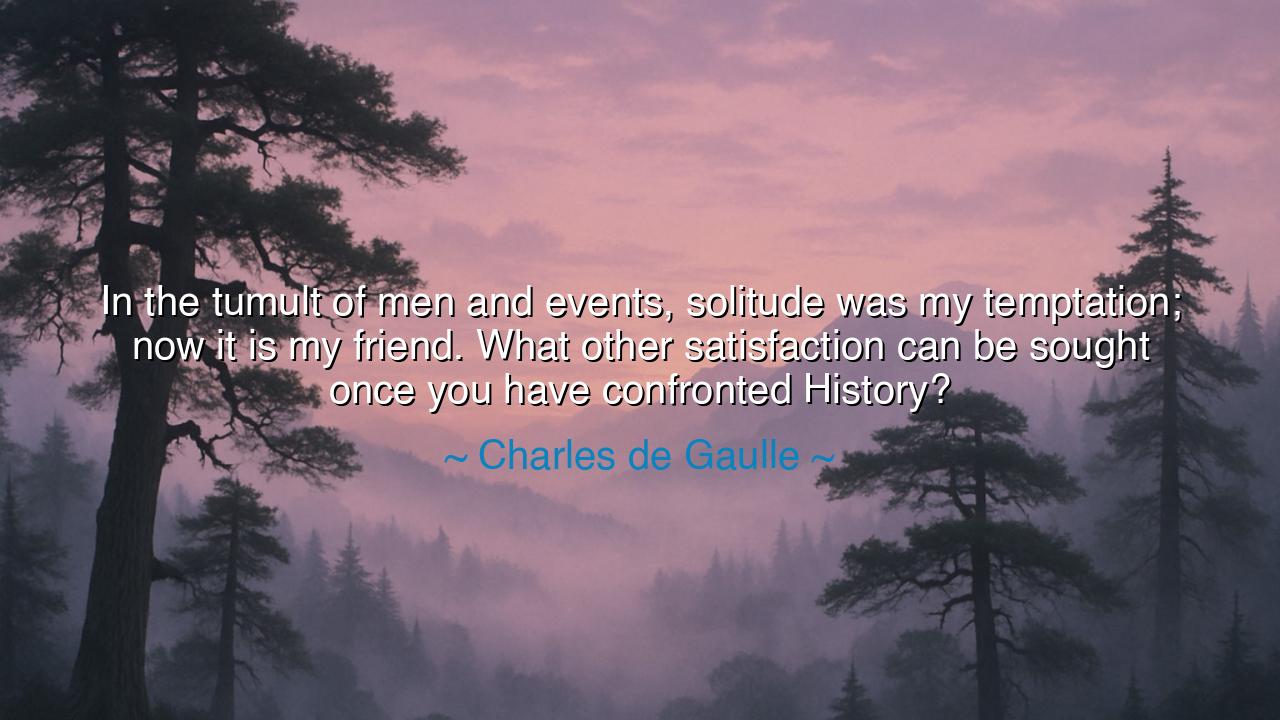
In the tumult of men and events, solitude was my temptation; now
In the tumult of men and events, solitude was my temptation; now it is my friend. What other satisfaction can be sought once you have confronted History?






When Charles de Gaulle, the soldier, statesman, and savior of France, wrote, “In the tumult of men and events, solitude was my temptation; now it is my friend. What other satisfaction can be sought once you have confronted History?” he spoke from the summit of experience — a man who had stood face to face with the maelstrom of destiny, who had borne the weight of a nation upon his shoulders, and who, at last, found in solitude not exile, but peace. His words are not those of a recluse fleeing from the world, but of a man who had looked into the heart of power, glory, and struggle — and seen their limits. For de Gaulle, solitude became the final companion of greatness: the quiet that remains after the storm of history has passed.
The origin of this quote lies in de Gaulle’s later reflections, after a lifetime of service to his country. He had led Free France in the darkest days of World War II, when Europe lay crushed under tyranny and despair. His voice, transmitted from London over the airwaves, became the heartbeat of resistance — a lonely cry that awakened a nation’s soul. Later, he rebuilt France from ruin, faced revolts, and shaped a new Republic. Yet in all this triumph, he knew isolation; he stood alone against allies and enemies alike. In his solitude, he saw not weakness, but clarity — for he had lived long enough to know that leadership often means standing apart, that history’s greatest burdens are carried in silence.
When de Gaulle speaks of “the tumult of men and events,” he describes the endless roar of ambition, conflict, and vanity that fills the world of politics and power. To walk amid that tumult is to be surrounded by voices — each clamoring for attention, each whispering of gain or glory. Yet, for those who have truly “confronted History,” who have faced its elemental forces — war, revolution, destiny — the noise of men becomes faint, even trivial. De Gaulle had wrestled with History itself, that merciless spirit which tests nations and judges leaders. And having stood in its presence, he found that no earthly satisfaction — not praise, not wealth, not power — could compare. The one reward left was solitude, the company of one’s own soul.
There is a paradox here, as profound as it is human. When he was young, solitude had been de Gaulle’s temptation — a desire to withdraw, to think, to be untouched by the chaos of men. Yet duty called him into that chaos; the world demanded his service. He obeyed, not out of ambition, but out of conviction. And when his work was done, when he had confronted the great storm of his century, he returned at last to solitude — but now as an old friend, not a distant dream. This solitude was no longer the coward’s escape; it was the warrior’s rest. It was the silence earned by one who had fought the battles of history and no longer needed to prove himself to its noise.
In this, de Gaulle resembles the ancient heroes who, after long campaigns, withdrew to the mountains or the sea — men like Cincinnatus, who left the plow to save Rome and then returned to his fields when the republic was secure. De Gaulle, too, withdrew to his village of Colombey-les-Deux-Églises, content to live among his books, his thoughts, and the whispers of the past. In solitude, he found communion not with men, but with History itself — the silent witness of all human striving. For those who have confronted History, he says, no lesser satisfaction remains. One does not return from the summit of destiny to the petty quarrels of the valley.
Yet his words hold a lesson for all generations, not only for statesmen and warriors. He reminds us that in a world of noise and distraction, solitude is not an enemy, but a teacher. Only in silence can one hear the voice of conscience; only apart from the crowd can one see clearly the face of truth. The modern soul, overwhelmed by “the tumult of men and events,” must learn again the art of withdrawal — not as escape, but as renewal. To seek solitude is to seek strength; to embrace it is to know peace.
So, O seeker of wisdom, remember de Gaulle’s teaching. Do not fear solitude, for it is the crucible in which character is forged. Engage with the world — fight its battles, uphold what is right — but know when to step away, to rest in the company of your own spirit. Let solitude cleanse you of the vanity of applause and the burden of ambition. For when you have, in your own way, “confronted History” — when you have faced the trials of your time with courage and integrity — you will find, as de Gaulle did, that there is no greater satisfaction than the quiet friendship of the self, and no truer companion than the stillness of the heart.
And thus, through his words, the great general speaks not only to his nation but to all humankind: that after the storms of life, when the noise of men fades into memory, solitude remains — not as emptiness, but as triumph. It is there, in that sacred silence, that the soul meets eternity and whispers, “I have lived.”






AAdministratorAdministrator
Welcome, honored guests. Please leave a comment, we will respond soon